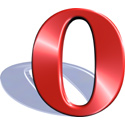 There’s a saying about the elephant in the room that no one will talk about. Everyone knows it’s there, but by some unspoken rule no one will mention it. I’ve noticed that when web browsers are compared, there’s one thing Opera supporters tend to ignore or downplay: Opera’s business model.
There’s a saying about the elephant in the room that no one will talk about. Everyone knows it’s there, but by some unspoken rule no one will mention it. I’ve noticed that when web browsers are compared, there’s one thing Opera supporters tend to ignore or downplay: Opera’s business model.
Internet Explorer and Safari are bundled with their respective operating systems, and so they’re perceived as free. Firefox is free in both the gratis and libre senses of the word. Opera, however, is ad-supported by default and will disable the ads if you pay for it.
You can use Opera without paying money, but you’re still paying it in attention (a persistent chunk of space dedicated to advertising), so in comparison to the other three leading browsers, it’s perceived as being less free. Think of it in terms of television.
So the perception of cost looks like this:
- IE, Safari, Firefox (commercial-free TV)
- Ad-supported Opera (network TV)
- Paid-for Opera (cable or satellite)
Most people really do prefer free without ads to free with ads or paid subscriptions. Why else is skipping commercials one of Tivo’s most popular features?
I’m certain this impacts marketshare, and it definitely impacts media coverage. Just look at CNET’s recent IE vs. the world review. Opera 8 gets high marks for features, but what’s the summary? “Despite a ton of great technology in Opera, few consumers will be likely to pay for the app. ” Whether you think the review is otherwise fair or not, the business model clearly lowered it several notches on the reviewer’s scale.
Next: Firefox’s blind spot.
Disclaimer: I’m a regular Firefox user these days, but I’ve also paid to register Opera since version 3.5 was current back in 1999. I used Opera as my main web browser on Windows back when Netscape 4 was aging and Mozilla hadn’t yet stabilized enough to replace it.

